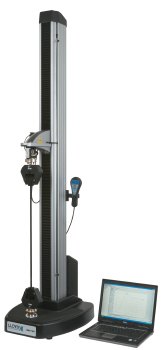The new LS2.5 materials testing machine completes the family of single column instruments from Lloyd Instruments which also includes the LS1 and recently launched LS5 materials testing machines.
The LS2.5 features 1400 mm crosshead travel and high speed range of 0.01 - 2032 mm/min, making it ideally suited for testing plastic, rubber and other high elongation materials. From stand-alone operation via the convenient, integral control console to PC-control using Lloyd Instruments' well-respected NEXYGENPlus materials testing software, the LS2.5 is an affordable, easy to use system.
 The LS2.5 materials testing machine from Lloyd Instruments.
The LS2.5 materials testing machine from Lloyd Instruments.
With a force capacity of 2500 N (562 lbf) and using high accuracy interchangeable YLC Series loadcells for tension, compression and cycling through zero force measurements, the LS2.5 load measuring system exceeds the requirements of all recognised international standards. Modern linear guide technology, pre-loaded ball screws and advanced software compensation means that there is no compromise on mechanical stiffness over the extended crosshead travel range.
A small tabletop footprint and large work area combine with a wide range of standard grips and fixtures, extensometers and software to establish the LS2.5 as a versatile materials testing system capable of making tensile, compression, flexural, friction, insertion/extraction, peeling, tearing and creep/relaxation tests on a vast range of material types and components.
An integral console with a membrane multi-function keypad and easy to read backlit LCD provides stand-alone control and display. The control console displays prompts and menus as well as load and extension information, to guide the user through machine operations. The system is capable of storing up to 600 test results from a choice of 10 programmable test set-ups.
Direct linking to a laptop or PC via a USB interface allows control of the LS2.5 by the powerful and flexible NEXYGENPlus material test and data analysis software. The NEXYGENPlus User Configurable Test functionality complements a comprehensive built in test standards library and test information can easily be exported to Microsoft products such as Word, Excel and Outlook.